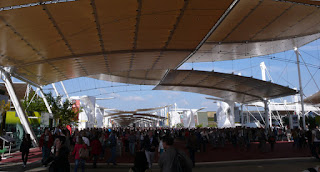Sustainability
as Entertainment
along the Cardo and Decumanus
 |
| the Swiss Pavilion |
I
gave a talk about the TASIS campus as an alternative to the crisis of sprawl at
the Swiss Pavilion at Expo Milano
on October 10. Expo’s ostensible theme is Feeding
the Planet, and while there was a subtext of food at the national
pavilions, this is hardly comes off as an event intended to change the world.
After all, McDonald’s had a place on the so-called Decumano (allusions to the
Roman decumanus being a form of pretense without much substance). This was
sustainability as entertainment, and wow, does it work: on a beautiful autumn
Saturday it was absolutely packed, the waits to get into many of the pavilion
exhibits ranging toward four and even
 |
| the Decumano looking west |
 |
| benvenuti in Italia! |
Questions are
un-escapable about how sustainable the Expo itself is: the Expo website has a
page on Sustainable
Expo, but when I visited it the link to Sustainable Architecture of Self-Built
Pavilions was broken. It’s one thing to recycle building materials, another to
reuse buildings; I suspect there will be much more of the former than the
latter. The Swiss pavilion tower, earnestly didactic almost to the point of
pedantry about limited food resources, was built of concrete, steel and glass,
accessible only by (small) elevator, much of it hard to imagine being salvaged
and reused—although the glue-laminated timber passerelle that snakes its way
somewhat irrationally (formal rationalism may no longer be the dominant Swiss
mode) around the tower could theoretically be unbolted and reassembled. Very
few pavilions could be recognized for their national identity without
signage—Italy perhaps most egregiously; but this is in a way to say that few
were in any sense evocative of traditional architecture (Romania being among
the notable exceptions).
 |
| feel the slove-nia |
 |
| Mmmmm, meat! |
This
was, paradoxically if not cynically, not at all about seriously dealing with
hunger, healthy eating, traditional foods (the only “traditional” displays of
food were Dante Ferretti’s jumbo-crèche carts of fake food along the center of the
Decumano), or biodiversity. This was about consumption being swallowed with a
soupçon of concern. Feel good about yourself while chowing down at a food cart
in a throw-away landscape!
 |
| taking the long view: Yikes! |
Zooming out and seeing the fair in context, the
increasingly nightmarish landscape that takes over as Milan dissipates into its
periphery begs the question of how the Expo could have been more
“constructive:” maybe rehabilitating a dilapidated neighborhood instead of
operating in a cordoned-off hinterland? Taking over an at-risk or moribund
field and rendering it arable? But this Expo isn’t all about constructive
change, it’s more about the status quo—and full steam ahead! Fortunately, many
in the food world are more serious than Expo expresses, and certainly more
enlightened than the hegemonic architectural forms on display. They have Slow Food, where's the Slow Architecture?
